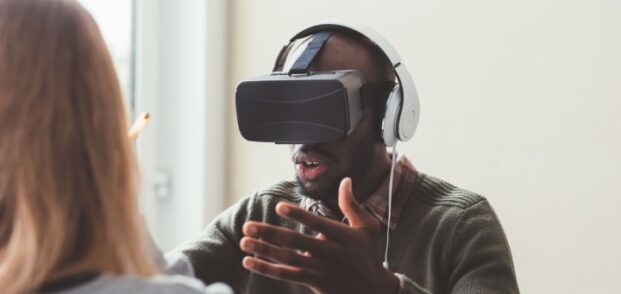Integrating and Motivating Gen Z in the Workplace
Our latest white paper explores the challenges that come with a new generation entering the workforce – how can we smoothen this process as much as possible?

Each time a new generation enters the workforce, it can cause difficulties as varied worldviews and values mix. Gen Z, those born between 1997-2012, is no different. Plenty of research has been done on Gen Z’s emerging position in the workplace, and there are effective, modern solutions to integrating and motivating these young workers. These solutions involve a variety of training options that range from onboarding through to sustained cultural drives that affect every strata of your organisation, aiming to promote alignment between Gen Z and the various aspects of your organisation.
For Gen Z, integration with an organisation begins at a value level. Diversity is particularly important, with 56% of Gen Z saying they would turn down a job from a company without diverse leadership (Altes, 2025). Another factor is the environment: while Gen Z is actually the least likely to act on their environmental worries, they are the most likely to say the responsibility for the environment lies with brands and organisations (Nuttall, 2025). Since Gen Z considers the onus for these issues to be on organisations, ensuring that your organisation aligns with these values will ease integration. Including topics such as EDI and Environmental Awareness in your onboarding compliance training is a quick way to make a good first impression, and organising a sustained culture push may also attract Gen Z talent and support long term integration and motivation. This may have to be pushed by line managers, but could be supported by a sustained, regular supply of microlearning on relevant topics.
Another aspect of integrating Gen Z into your organisation is promoting cohesion between Gen Z and their managers, many of whom are Gen X, born between 1965-1980 (“Most Execs are Now Gen X. What Does that Mean?”, 2023). Studies by Deloitte reveal several points of divergence between Gen Z and their managers, such as empathy being the second most important trait that Gen Z look for in their managers while managers rank it as only 5th (Dunlop & Pankowski, 2023). To promote cohesion, it can be beneficial to train managers in any soft skills that Gen Z highly value, while implementing a reverse-mentorship scheme, as Dunlop and Pankowski suggest (2023), to identify and attempt to solve knowledge, alignment, and execution gaps between the two groups.
It is not solely managers’ responsibility to adapt for cohesion and alignment, however. In studies by Linkedin, it was found that 61% of L&D professionals believe Gen Z will need more help developing their soft skills (Zlatkov, 2019), and Forbes suggest relationship, conflict management, accountability, sense making, and resilience skills as five key areas that many Gen Z need to develop (Brower, 2024). While theoretical in part, the reasons often assumed for Gen Z’s poor social skills are their prevalent use of social media for communication, often via text without any cues beyond the words, and the impact of the covid-19 pandemic and subsequent lockdown. Lauren Stiller Rikleen actually stated that Gen Z lived through in the pandemic ‘the greatest national trauma since the Great Depression and World War II.’ (Wang, n.d.) While the oldest Gen Z were 23 in 2020, and may have already entered the workplace, the majority of the generation were still in their highly formative teenage years, and online schooling deprived them of socialising at an important time in their development. By training Gen Z in these skills, not only will it aid in integrating them into your organisation, it will also provide them with tools they may appreciate. Over half of American Gen Z have a side hustle (Mercer, 2025), and equipping them with skills that will assist them in their own projects may therefore promote motivation and loyalty amongst young workers.
Upskilling Gen Z is vital for long term motivation, as studies by Deloitte into the motivational differences between Gen Z and older generations highlight that their strongest motivator is opportunities for growth (Vickberg, 2023). The five key soft skills that Forbes recommend are a solid starting point, but Gen Z themselves are also explicitly interested in developing hard skills according to studies by Deloitte (Vickerberg, 2023) and Linkedin (Zlatkov, 2019). Investing the resources to developing these hard skills are another strong way of developing motivation and loyalty for Gen Z. IT skills are a point of alignment between employers and Gen Z here, being a hard skill expected in the office that hasn’t been taught to Gen Z in schools (Berger, 2023). In Forbes’ article signposting the results of a study by Linkedin into the most valuable skills for 2025, they recommend a few notable hard skills, including AI Literacy, Large Language Model Development and Application, and Budget and Resource Management (Castrillon, 2025). These are all also good options for both future-proofing your organisation and delivering relevant upskilling to young employees. If developing an employee’s skills vertically isn’t an option, a way of circumventing this issue is to temporarily switch Gen Z’s roles to develop their skills laterally. Not only does this align your organisation with Gen Z’s wishes, it develops well-rounded, versatile employees that can support various sectors of your organisation.
At their core, all of these solutions revolve around an ethos of alignment, whether that’s of Gen Z and the organisation’s values, or GenZ and their managers’ values, achieved largely through cultural pushes and various training or development options. If that alignment can be reached and maintained over time, Gen Z should effectively integrate into your organisation and remain motivated employees.
Bibliography
Altes, K. (2025). The Future is Gen-Z: 5 Proven Strategies to Engage Tomorrow’s Workforce. Forbes. https://www.forbes.com/councils/forbescoachescouncil/2025/07/24/the-future-is-gen-z-5-proven-strategies-to-engage-tomorrows-workforce/
Berger, C. (2023). Bosses are Getting Gen Z’s Skills Deficit all Wrong: The Generation Says it’s Hard, Not Soft, Skills They Need to Learn. Fortune. https://fortune.com/2023/10/01/gen-z-soft-hard-skills-training/
Brower, T. (2024). 5 Skills Gen Z Must Build for Happiness and Success. Forbes. https://www.forbes.com/sites/tracybrower/2024/04/14/skills-gen-z-must-build-for-success/
Castrillon, C. (2025). Linkedin Reveals the Most In-Demand Skills on the Rise for 2025. Forbes. https://www.forbes.com/sites/carolinecastrillon/2025/03/19/linkedin-reveals-the-most-in-demand-skills-on-the-rise-for-2025/
Dunlop, A & Pankowski, M. (2023). Hey Bosses: Here’s What Gen Z Actually Wants at Work. Deloitte Digital. https://www.deloittedigital.com/us/en/insights/perspective/gen-z-research-report.html
Mercer, J. (2025). Gen Z Characteristics at Work in 2025 – The Generation That’s Transforming the Modern Workplace. Grove HR. https://grovehr.com/generation-z-characteristics/
Most Execs are Now Gen X. What Does that Mean?. (2023). The HT Group. https://www.thehtgroup.com/most-execs-are-now-gen-x-what-does-that-mean/
Nuttall, C. (2025). 12 Characteristics of Gen Z in 2025. GWI. https://www.gwi.com/blog/generation-z-characteristics
Wang, J. (n.d.). What Employers Need to Know About Hiring Gen Z. Hays. https://www.hays.co.uk/market-insights/article/what-employers-need-to-know-about-gen-z
Vickberg, S. (2023). Help me Grow! What Motivates Gen Z?. Deloitte US. https://www.deloitte.com/us/en/services/consulting/blogs/business-chemistry/help-me-grow-what-motivates-gen-z.html
Zlatkov, B. (2019). 7 Surprising Insights About How Gen Z Wants to Learn. Linkedin. https://www.linkedin.com/business/learning/blog/learning-and-development/do-you-know-how-gen-z-really-wants-to-learn-7-surprising-insigh








